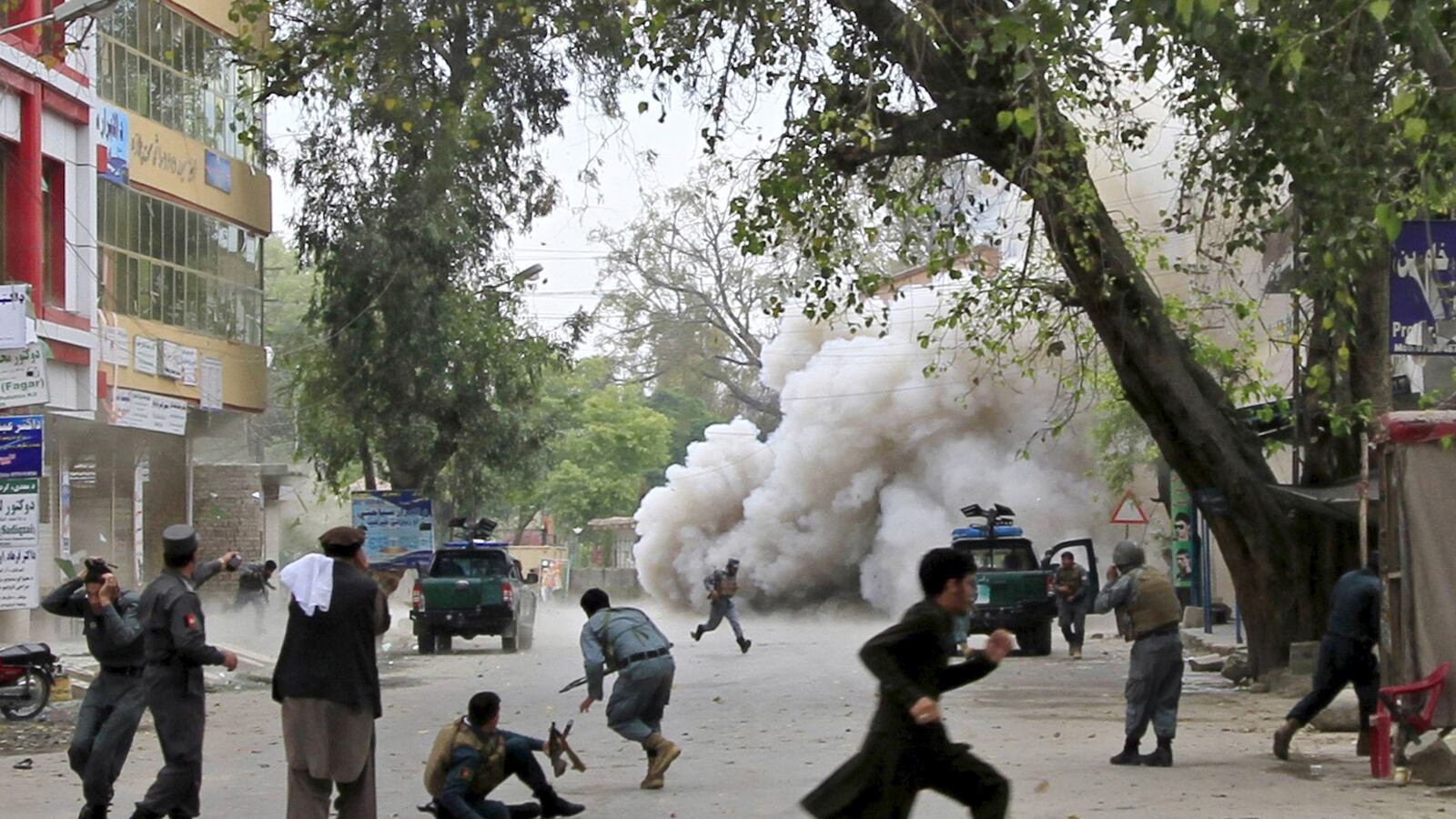ISIS loyalists may have claimed credit for Saturday bombing that killed at least 35 people in eastern Afghanistan. But U.S. officials now believe that Taliban fighters—not the Middle East-based extremist group—carried out the strike. Had ISIS been responsible, it would have been among the deadliest attacks by the group outside the Middle East.
It’s one sign among many that the international expansion by the self-described Islamic State might not be as serious as it once appeared—at least, not so far.
“We have not yet seen evidence of ISIS direction or support of the attacks. Jalalabad continues to be an area with significant Taliban influence and this attack fits the pattern of past Taliban attacks in the region—underscoring that this attack does not represent a fundamental change in the security environment,” Army Lieutenant Colonel Chris Belcher, a spokesman for NATO’s mission in Afghanistan, said in a statement to The Daily Beast. “Along with our partners in the Afghan security forces, we are looking closely to determine any connection with ISIS.”
What’s more, a spokesman for ISIS in Afghanistan denied that his group was responsible for the attack, which sparked outrage among Afghans.
“ISIS was not behind the deadly blast in Jalalabad, and we condemn such an attack,” Sheikh Muslim Dost told The Daily Beast. “This is an act of the Pakistani agencies to damage reputation of the ISIS.”
That both sides are condemning the attacks suggest neither wants to be held accountable for the deaths of mostly poor Afghan civilians.
Whether ISIS was responsible or not, the group’s claims that it’s extending its reach from West Africa to South Asia appear to be overblown. In fact, there’s little evidence so far to support the theory that ISIS is expanding its state outside the Middle East—and with it, the danger it could pose to the West.
While ISIS has dispatched emissaries to places like Afghanistan to make financial promises in exchange for allegiance to the Islamic State brand, three U.S. officials told The Daily Beast there is no evidence of widespread funding or fighters traveling from the Arab world to places like Afghanistan.
Rather, U.S. officials said, they see ISIS trying to reach a more basic goal: to establish relationships with fellow jihadists. Former Taliban members in Afghanistan have “defected” to ISIS; militants in Libya have pledged allegiance, as has Boko Haram in Nigeria. But so far, these officials added, they aren’t seeing the terror groups banding together in an operational or strategic sense.
“We are seeing the first stages of relationship building,” a senior defense official told The Daily Beast.
With major territorial losses in Iraq and Syria, ISIS appears to have struggled to expand its state outside the Middle East. The group may have members around the world embracing its brand. That doesn’t mean those jihadists are able to expand the ISIS caliphate, experts said.
“ISIS wants you to think it is absolutely everywhere,” said Daveed Gartenstein-Ross, a senior fellow at the Washington, D.C.-based Foundation for Defense of Democracies. “ISIS has players in far more theaters than it can be considered a major force in.”
The suicide bombing in the city of Jalalabad was among the deadliest attacks to hit the country in months, killing mostly civilians. Shortly after the strike, a spokesman for the Islamic State in Afghanistan claimed responsibility for the attack while the Taliban condemned the bombing. Even Afghan President Ashraf Ghani tied the attack to ISIS—though he did not provide details.
“Taliban did not claim responsibility, but Daesh claimed responsibility,” Ghani stated, using a prerogative for ISIS.
At its peak, ISIS has released maps showings it hopes to expand its caliphate through much of Africa and into Asia. As it expanded its land grab last year in the Middle East, various groups vowed allegiance to ISIS and its leader, Abu Bakr al-Baghdadi. The group reciprocated that relationship in several countries, including in Afghanistan.
In a 16-minute video released in January, Hafez Sayed Khan Orakzai, a former commander of the Pakistani Taliban, pronounced himself the current leader of ISIS in Afghanistan and Pakistan, commonly referred to as Islamic State Khorasan (ISK), a historic name for the region. ISK’s goal was, in part, to unseat the Taliban’s grip on the region; the new group consisted largely of defectors of the Taliban.
But since appearing in that video, Orakzai and his group had rarely been heard from—until this month.
First, the group claimed it killed three Pakistani soldiers. Then, on Saturday, ISK posted a photo of a man identified as the suicide bomber. “Many congratulations to all on the first…attack by the Province of Khorasan,” the group wrote in a tweet, according to The Wall Street Journal.
ISK has struggled to establish itself in both Afghanistan and Pakistan. In Afghanistan, residents have not been receptive. Moreover, the Taliban has fiercely fought ISK, which rejects Taliban leader Mullah Omar. The ongoing U.S. presence in Afghanistan also has made it challenging for the group to expand.
“If the Afghan Taliban has proven anything over the last decade, it is that it is resilient, is militarily effective, has operational staying power, and can withstand exogenous shocks. All of that means that it is going to take more than just a relatively small ISK network, which up until this point has remained untested, to go militarily toe-to-toe with the Taliban for any extended period of time,” Don Rassler, with West Point’s Combating Terrorism Center, wrote in a March paper.
In Pakistan, ISK confronts an omnipresent Pakistani military and an unwelcoming public, Rassler wrote.
It is unclear why Ghani tied the attack to ISIS. Some officials privately speculate the president, who wants U.S. troops to extend their stay, hoped the attack would prompt U.S. military would keep its troops in longer.
—with additional reporting from Sami Yousafzai in Kabul, Afghanistan.






